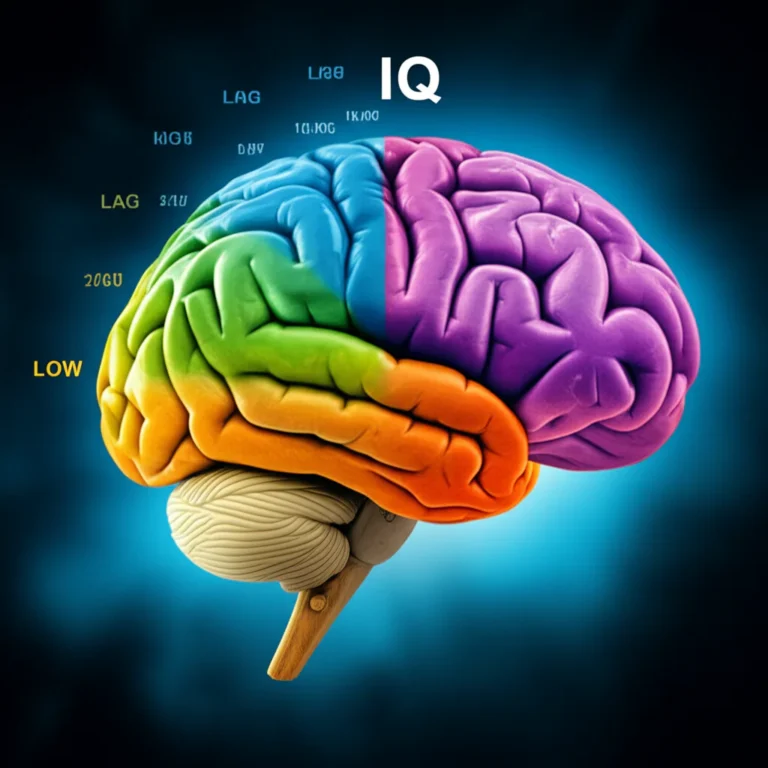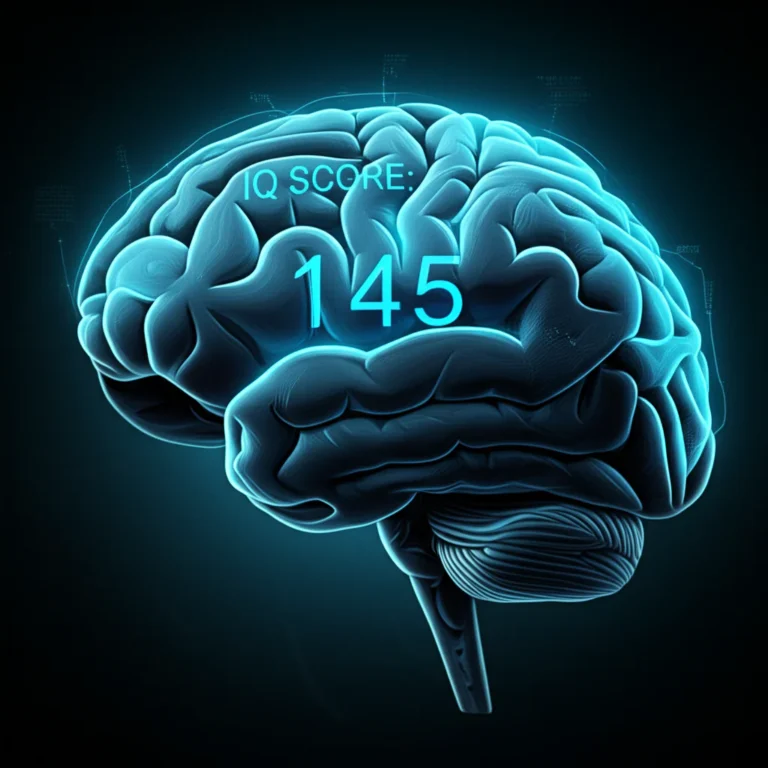Support our educational content for free when you buy through links on our site. Learn more
15 Surprising Benefits of an IQ Score Above 130 (Like 132) in 2025 🚀
Have you ever wondered what it truly means to have an IQ score above 130—say, a 132? Beyond the bragging rights and Mensa invitations, a high IQ can unlock a treasure trove of cognitive perks, life advantages, and unique challenges. In this article, we dive deep into the 15 remarkable benefits that come with such a score, from accelerated learning and creative breakthroughs to enhanced problem-solving and leadership potential.
But it’s not all smooth sailing—high intelligence can bring its own set of social and emotional hurdles. Stick around as we unpack both sides of the coin and share expert tips from the Free IQ Tests™ team on how to maximize your intellectual gifts while staying balanced and fulfilled. Curious about how your IQ score stacks up or how to leverage it for career success? We’ve got you covered with real stories, science-backed insights, and practical advice.
Key Takeaways
- An IQ above 130 places you in the top 2% of the population, signaling exceptional cognitive abilities.
- Benefits include faster learning, superior problem-solving, creativity, and leadership potential.
- High IQ can also bring challenges like social isolation, emotional intensity, and perfectionism.
- Nurturing your gift with lifelong learning, brain-healthy habits, and supportive communities is essential.
- IQ tests measure specific cognitive skills but don’t capture creativity or emotional intelligence, so use your score as a tool, not a label.
Shop Brain-Boosting Tools & Learning Resources
- Brain-Training Apps: Lumosity on Amazon | Elevate on Amazon
- Educational Platforms: Coursera | edX
- Books for Gifted Minds: “Thinking, Fast and Slow” on Amazon | “Grit” on Amazon
Table of Contents
- ⚡️ Quick Tips and Facts: Decoding Your High IQ Score
- Beyond the Numbers: Understanding What an IQ Score Above 130 Truly Means
- Unlocking Your Potential: The Remarkable Benefits of a High IQ Score (130+)
- 🚀 Accelerated Learning & Rapid Knowledge Acquisition
- 💡 Enhanced Cognitive Processing & Superior Problem-Solving Skills
- 🎨 Unleashed Creativity & Innovative Thinking
- 🎯 Sharpened Analytical & Critical Thinking Abilities
- 🏆 Greater Academic & Professional Success: A Path to Excellence
- 🧠 Improved Memory & Exceptional Information Retention
- 🔍 Advanced Pattern Recognition & Strategic Insight
- 🌐 Deeper Understanding of Complex Concepts & Abstract Ideas
- 🗣️ Potential for Effective Leadership & Influence
- 💪 Enhanced Adaptability & Resilience in Challenging Situations
- ✨ Unique Perspectives & Profound Insights
- 🧘♀️ Stronger Self-Awareness & Introspection
- 🛠️ Ability to Master New Skills & Hobbies Quickly
- 🌍 Potential for Significant Societal Contributions
- 📚 Profound Enjoyment of Intellectual Pursuits & Lifelong Learning
- The Double-Edged Sword: Navigating the Nuances and Potential Challenges of a High IQ 🤯
- Nurturing Your Gift: Maximizing Your Intellectual Potential and Well-being 🧠
- IQ Testing Demystified: What It Is, What It Isn’t, and What Your Score Means for You 🤔
- Real-World Impact: Inspiring Stories of High Achievers and Their Journeys
- The “Free IQ Tests™” Perspective: Our Expert Advice on Embracing Your High IQ Journey
- Conclusion: Embracing Your Intellectual Journey with Confidence and Purpose
- Recommended Links for Further Exploration
- FAQ: Your Burning Questions About High IQ Answered!
- Reference Links
⚡️ Quick Tips and Facts: Decoding Your High IQ Score
So, you’ve discovered you have an IQ score of 132, or somewhere in that brilliant ballpark. What’s the big deal? Is it time to start practicing your Nobel prize acceptance speech? Before you do, let’s break down the essentials with some rapid-fire insights from our team at Free IQ Tests™.
- You’re in an exclusive club! An IQ score of 130 or higher places you in the top 2% of the population. That’s right, you’re an outlier in the best possible way.
- What does “gifted” even mean? Generally, a score above 130 is considered “gifted.” This isn’t just a fancy label; it signifies advanced intellectual abilities that might mean you learn and process information differently than most. Wondering if a 132 IQ is good? We’ve got a whole article on that!
- It’s a predictor, not a prophecy. Intelligence researcher Stuart Ritchie notes there’s “a massive amount of data showing that [IQ is] one of the best predictors of someone’s longevity, health, and prosperity.” However, it’s a starting point, not a guarantee of a corner office.
- Mensa is calling! High-IQ societies like Mensa International often have a cutoff score around the 98th percentile, which typically means an IQ of 132 or higher on a standard test.
- It’s not just about book smarts. While IQ tests measure cognitive skills like reasoning and problem-solving, they don’t capture the full picture of your potential. Things like creativity, emotional intelligence, and good old-fashioned grit are just as crucial for success.
Beyond the Numbers: Understanding What an IQ Score Above 130 Truly Means
Let’s be real, seeing a number like 132 on an IQ test result can feel a bit like getting a secret decoder ring. It’s cool, but what does it actually unlock? Here at Free IQ Tests™, we believe that understanding your score is the first step to harnessing your potential. An IQ score isn’t a final grade on your brain; it’s a snapshot of your cognitive horsepower.
Imagine intelligence distributed on a bell curve. Right in the middle, at the peak of the bell, is the average IQ of 100, where most people land. As you move away from the center, the scores become less common. A score of 132 puts you way out on the right side of that curve, in the territory of superior cognitive ability.
A Glimpse into Giftedness: The History and Evolution of IQ Measurement
The concept of measuring intelligence isn’t new. It all started in the early 1900s with a French psychologist named Alfred Binet, who was tasked with identifying students who needed extra help in school. His work laid the foundation for the modern IQ test. Over the decades, these tests have been refined, with notable versions like the Stanford-Binet Intelligence Scales and the Wechsler Adult Intelligence Scale (WAIS) becoming the gold standard.
These tests have evolved from simple school placement tools to complex assessments that measure various facets of intelligence, including:
- Verbal Reasoning
- Non-Verbal & Fluid Reasoning
- Working Memory
- Processing Speed
Understanding this history helps us appreciate that IQ testing is a science that has been honed for over a century to provide a reliable (though not perfect!) measure of cognitive abilities. For more details, check out our IQ Test FAQ.
What Does an IQ of 132 Really Signify? 🤔
An IQ of 132 signifies that your reasoning and problem-solving abilities are significantly above average. It suggests you have the potential to grasp complex concepts with relative ease, learn new things quickly, and see patterns that others might miss.
Think of it like having a high-performance engine in your car. You have the potential to go very fast and handle challenging roads, but you still need to learn how to drive, maintain the vehicle, and choose the right destinations. As the experts at Vanguard Gifted Academy put it, “A high IQ can be an indicator of potential, but it’s the nurturing of this potential through personalized and enriching educational experiences that truly allows gifted children to thrive.”
Unlocking Your Potential: The Remarkable Benefits of a High IQ Score (130+)
Okay, let’s get to the good stuff! What are the actual, real-world perks of having a brain that’s wired this way? It’s more than just being a trivia night champion (though that’s a definite bonus). Here are 15 benefits you might experience with an IQ of 132.
1. 🚀 Accelerated Learning & Rapid Knowledge Acquisition
One of the most significant advantages is the sheer speed at which you can learn. New languages, complex software, musical instruments—your brain is primed to absorb and integrate new information like a sponge. You might find yourself picking up in a few hours what takes others days or weeks to master.
2. 💡 Enhanced Cognitive Processing & Superior Problem-Solving Skills
When faced with a tricky problem, your mind can often process the variables more quickly and efficiently. You’re able to mentally model different scenarios, discard unworkable solutions, and zero in on the most effective path forward. Healthline notes that a high IQ could mean you’ll “fare well when faced with unusual or complex problems.”
3. 🎨 Unleashed Creativity & Innovative Thinking
High intelligence is often linked with “divergent thinking”—the ability to generate novel ideas and connect seemingly unrelated concepts. This is the bedrock of creativity. You might find yourself coming up with out-of-the-box solutions that surprise and delight those around you.
4. 🎯 Sharpened Analytical & Critical Thinking Abilities
You’re likely a natural-born skeptic (in a good way!). You don’t take information at face value. Instead, you dissect arguments, identify logical fallacies, and evaluate evidence with a fine-toothed comb. This makes you a discerning consumer of information in a world full of noise.
5. 🏆 Greater Academic & Professional Success: A Path to Excellence
Let’s be frank: a high IQ can open doors. It’s a strong predictor of academic achievement and can lead to success in intellectually demanding fields like science, engineering, law, and medicine. This aligns with the idea that a high IQ can give you “a leg up in certain situations, like getting the job you want.” This is a topic we explore deeply in our IQ and Career Development section.
6. 🧠 Improved Memory & Exceptional Information Retention
Your brain might function like a high-capacity hard drive with a lightning-fast search function. Whether it’s remembering facts from a book you read years ago or recalling a complex sequence of events, a strong working memory and long-term retention are common hallmarks of a high IQ.
7. 🔍 Advanced Pattern Recognition & Strategic Insight
From the stock market to a game of chess to social dynamics, life is full of patterns. Your brain is exceptionally good at detecting them. This allows you to make strategic decisions and anticipate outcomes with greater accuracy than most.
8. 🌐 Deeper Understanding of Complex Concepts & Abstract Ideas
Quantum physics? Philosophical paradoxes? Abstract art? You’re not intimidated. You have an innate ability to grapple with and find beauty in complex, abstract ideas that can leave others scratching their heads.
9. 🗣️ Potential for Effective Leadership & Influence
Your ability to see the big picture, devise strategies, and communicate complex ideas clearly can make you a natural leader. People are often drawn to your insights and confidence, giving you the potential to inspire and influence others.
10. 💪 Enhanced Adaptability & Resilience in Challenging Situations
Because you’re a quick learner and a skilled problem-solver, you’re often better equipped to adapt to unexpected changes. When life throws you a curveball, you’re more likely to analyze the new situation and pivot effectively.
11. ✨ Unique Perspectives & Profound Insights
You literally see the world differently. Your mind makes connections that others miss, leading to unique perspectives and profound insights on everything from art and culture to science and human behavior.
12. 🧘♀️ Stronger Self-Awareness & Introspection
A high IQ often comes with a rich inner world and a capacity for deep introspection. You’re more likely to analyze your own thoughts, feelings, and motivations, leading to a stronger sense of self-awareness.
13. 🛠️ Ability to Master New Skills & Hobbies Quickly
That hobby you’ve always wanted to try? You can probably become proficient at it much faster than the average person. This ability to rapidly achieve competence in new domains can make for a rich and varied life.
14. 🌍 Potential for Significant Societal Contributions
With great cognitive power comes great potential. Many of history’s greatest scientific breakthroughs, artistic masterpieces, and social innovations have come from individuals with exceptionally high intelligence. You have the potential to make a real, lasting impact on the world.
15. 📚 Profound Enjoyment of Intellectual Pursuits & Lifelong Learning
For you, learning isn’t a chore; it’s a joy. You have an insatiable curiosity and a genuine love for intellectual challenges, whether it’s tackling a complex puzzle, reading a dense book, or engaging in a spirited debate.
The Double-Edged Sword: Navigating the Nuances and Potential Challenges of a High IQ 🤯
Now, before you start feeling too much like a superhero, let’s talk about the kryptonite. Having a high IQ isn’t always a walk in the park. It can come with a unique set of challenges that are often misunderstood.
Social Dynamics & The Quest for Intellectual Peers
Ever felt like you’re speaking a different language from everyone else? You might make a witty, multi-layered joke that flies over everyone’s head, or you might get frustrated trying to explain a concept that seems simple to you. This can lead to feelings of isolation. As Vanguard Gifted Academy points out, gifted children can experience “asynchronous development,” where their intellectual capabilities outpace their social or emotional maturity, potentially leading to isolation. Finding people who can keep up with you—your intellectual peers—is crucial for your well-being.
Emotional Intensity, Perfectionism, and the Burden of Expectation
Many highly intelligent individuals experience emotions with greater intensity. You might also struggle with a relentless perfectionism, where anything less than flawless feels like a failure. This can be fueled by the high expectations placed on you by others (and by yourself). It’s a heavy burden to carry and can lead to anxiety and a fear of failure.
| Potential Challenge | What It Feels Like | A Healthy Reframe |
|---|---|---|
| ✅ Perfectionism | “If it’s not perfect, it’s a total failure.” | “Done is better than perfect. I will learn from my mistakes.” |
| ✅ Emotional Intensity | Feeling overwhelmed by your own emotions and the world’s problems. | “My sensitivity allows me to experience deep empathy and passion.” |
| ✅ Existential Anxiety | Constantly pondering the big, unanswerable questions of life. | “My curiosity about the universe is a source of wonder and lifelong learning.” |
| ❌ Imposter Syndrome | Feeling like a fraud, despite your accomplishments. | “I will own my achievements and recognize my capabilities.” |
Finding Your Place: Overcoming Misunderstandings and Isolation
Because you’re in a tiny minority, the world isn’t always set up for how your brain works. You might get bored and disengaged in traditional school or work environments that don’t challenge you. The key is to recognize that your needs are different and to proactively seek out environments and people that stimulate and understand you.
Nurturing Your Gift: Maximizing Your Intellectual Potential and Well-being 🧠
So, you have this high-performance brain. How do you keep it tuned up and happy? It’s not about coasting on your natural abilities; it’s about actively nurturing your gift.
Continuous Growth: Embracing Lifelong Learning and New Challenges
The worst thing you can do is let your brain get bored. A bored, brilliant mind can become a restless, unhappy one.
- Read voraciously: Dive into subjects you know nothing about.
- Take online courses: Platforms like Coursera or edX offer university-level courses on almost any topic.
- Learn a new skill: Try coding, a new language with an app like Duolingo, or a musical instrument.
Seeking Intellectual Stimulation: Beyond the Classroom and Workplace
Your day job might not always provide the intellectual heavy lifting you crave. Find outlets that do!
- Engage with complex hobbies: Think chess, strategy board games, or debate clubs.
- Visit museums and attend lectures: Immerse yourself in art, history, and science.
- Follow thought leaders: Watch TED Talks or listen to podcasts that challenge your thinking.
Mind-Body Connection: Fueling Your Brain for Optimal Performance
Your brain is a physical organ, and it needs care. Don’t neglect the basics:
- Nutrition: Foods rich in Omega-3s, antioxidants, and vitamins are essential for brain health.
- Exercise: Physical activity increases blood flow to the brain and can boost cognitive function.
- Sleep: This is when your brain consolidates memories and clears out toxins. Don’t skimp on it!
Finding Your Tribe: Connecting with Like Minds and Supportive Communities
This might be the most important tip of all. Connecting with other bright people can be a game-changer.
- Join a high-IQ society: Organizations like Mensa or Intertel are designed for this very purpose.
- Find online communities: Look for forums or social media groups dedicated to your niche interests.
- Attend conferences or workshops: These are great places to meet people who share your intellectual passions.
IQ Testing Demystified: What It Is, What It Isn’t, and What Your Score Means for You 🤔
At Free IQ Tests™, we’re obviously big fans of IQ tests as a tool. But we’re also realists. It’s crucial to understand what these tests are, and just as importantly, what they aren’t.
Reliable IQ Tests: What to Look For (and What to Avoid!)
There’s a huge difference between a professionally developed IQ test and a “What Kind of Pizza Are You?” online quiz.
- ✅ Professionally Administered Tests: The gold standards are tests like the Wechsler Adult Intelligence Scale (WAIS) and the Stanford-Binet. These are administered one-on-one by a trained psychologist. They are the most accurate but can be costly.
- ✅ Reputable Online Tests: While not a substitute for a professional evaluation, some online tests are carefully designed by psychologists to provide a reasonably accurate estimate. They often use questions that test fluid reasoning and pattern recognition. We pride ourselves on offering high-quality assessments in our Free IQ Tests section.
- ❌ Entertainment Quizzes: Avoid short, simple online “IQ tests” that are clearly just for fun. As Healthline warns, most online IQ tests are not valid. A real IQ test won’t ask you about your favorite color.
Understanding Your Score: Beyond Just a Number on the Page
Your overall IQ score is a composite. A full-scale test will often provide sub-scores in different areas (e.g., verbal comprehension, perceptual reasoning, working memory). Looking at these sub-scores can give you a much more nuanced understanding of your cognitive strengths and weaknesses. Perhaps you’re a verbal genius but your spatial reasoning is just average—that’s valuable information!
The Limitations of IQ Tests: Why They Don’t Tell the Whole Story
We have to be honest about the limitations. An IQ score is not a measure of your worth as a person.
- It doesn’t measure creativity or emotional intelligence. You can be a genius and still struggle to come up with an original idea or empathize with a friend.
- It doesn’t measure “grit” or perseverance. Success often comes down to who is willing to keep trying after they fail.
- It doesn’t predict happiness. Life experience, character, opportunity, and luck play huge roles in your life’s journey.
As Healthline aptly puts it, “Don’t read into this single number as the definitive measure of your intelligence.” It’s one data point among many that make you who you are.
Real-World Impact: Inspiring Stories of High Achievers and Their Journeys
History is filled with brilliant minds who have changed the world. While their IQ scores are often estimates, they serve as inspiring examples of what a high-powered intellect can achieve. People like Albert Einstein and Stephen Hawking, both thought to have IQs around 160, revolutionized our understanding of the universe. Their stories show that a high IQ, when combined with passion, curiosity, and relentless hard work, can lead to extraordinary outcomes.
But it’s not just about famous physicists. High-IQ individuals are innovating in every field, from developing life-saving technologies to creating breathtaking works of art. Their journeys are rarely straight lines; they are filled with challenges, setbacks, and the same struggles everyone faces. The difference is often their unique ability to analyze those setbacks and chart a new course. You can read about more inspiring figures on our Famous IQ Scores page.
The “Free IQ Tests™” Perspective: Our Expert Advice on Embracing Your High IQ Journey
Here’s our final take from the team. Discovering you have an IQ of 132 is like being handed a key. It’s not the destination itself, but it can unlock doors you might not have even known were there.
Embrace it, don’t be defined by it. See your intelligence as a powerful tool. Use it to learn, to create, to solve problems, and to help others. But don’t let it become a label that limits you or isolates you. Remember that your character, your kindness, and your passions are what truly define you.
The first YouTube video embedded above, titled “What does it mean to have a gifted IQ of 130?”, is a great resource that covers this topic visually and could be very helpful. You can find it at #featured-video.
Your intellectual journey is yours to shape. Be curious. Be bold. And most importantly, have fun with the amazing mind you’ve been given.
Conclusion: Embracing Your Intellectual Journey with Confidence and Purpose

So, what have we uncovered on this fascinating journey through the world of high IQ scores, especially one like 132? First off, congratulations! You’re part of a rare group with exceptional cognitive abilities that open doors to accelerated learning, creative problem-solving, and profound insights. But remember, your IQ is a starting point, not a finish line. It’s a powerful tool—one that thrives best when nurtured with curiosity, continuous learning, and meaningful connections.
We also explored the flip side: the challenges of social isolation, emotional intensity, and the pressure of high expectations. These are real, but manageable with self-awareness and the right support system. Your intellectual gift is not a solitary burden but a shared opportunity to contribute, inspire, and grow.
If you’ve ever wondered, “Is 132 IQ good?” or “What can I do with this score?”—the answer is a resounding yes, and the possibilities are vast. Your journey is uniquely yours, but armed with knowledge, community, and a growth mindset, you’re set to make the most of it.
Ready to dive deeper? Explore our recommended resources below, and don’t forget to visit our Free IQ Tests™ for more insights and tools to understand and develop your intelligence.
Recommended Links for Further Exploration
Looking to expand your intellectual toolkit? Here are some highly recommended books and resources that complement your high IQ journey:
-
“Thinking, Fast and Slow” by Daniel Kahneman — A deep dive into the two systems of thought that drive our decisions and reasoning.
👉 Shop on: Amazon -
“Grit: The Power of Passion and Perseverance” by Angela Duckworth — Explores why perseverance often beats raw talent.
👉 Shop on: Amazon -
“The Gifted Adult: A Revolutionary Guide for Liberating Everyday Genius” by Mary-Elaine Jacobsen — Tailored for adults with high IQs seeking to understand and thrive.
👉 Shop on: Amazon -
Mensa International — Join the global high IQ society or explore resources for gifted individuals.
Visit: mensa.org -
Vanguard Gifted Academy — Specialized educational programs for gifted children and teens.
Visit: vanguardgiftedacademy.org
Shopping Links for IQ-Boosting Tools and Resources
-
Brain-Training Apps & Platforms:
-
Educational Courses & Platforms:
FAQ: Your Burning Questions About High IQ Answered!

How does having an IQ above 130 affect learning and problem-solving skills?
Having an IQ above 130 typically means you have enhanced cognitive abilities that allow for faster processing of information, better pattern recognition, and superior reasoning skills. This translates into quicker learning, the ability to grasp complex concepts with less effort, and more effective problem-solving strategies. However, it’s important to remember that learning is also influenced by motivation, environment, and emotional factors. A high IQ provides a strong foundation but doesn’t guarantee mastery without effort and engagement.
Can a high IQ score improve career opportunities and success?
Absolutely! High IQ scores often correlate with academic achievement and the ability to perform well in intellectually demanding careers such as science, technology, engineering, law, and medicine. Employers value problem-solving skills, adaptability, and critical thinking—all strengths associated with higher IQs. That said, career success also depends on interpersonal skills, emotional intelligence, perseverance, and networking. IQ is a valuable asset but not the sole determinant of professional achievement.
Read more about “Is an IQ of 130 Truly Gifted? 7 Surprising Facts You Need to Know! 🧠 (2025)”
What are the social and emotional benefits of a high IQ?
Socially and emotionally, a high IQ can offer greater self-awareness, the ability to understand complex social dynamics, and deeper empathy when combined with emotional intelligence. Many high-IQ individuals enjoy rich intellectual conversations and meaningful relationships with like-minded peers. However, they may also face challenges such as feeling isolated or misunderstood. Cultivating emotional intelligence and finding supportive communities can enhance social well-being.
How can high IQ individuals manage emotional intensity?
Emotional intensity is common among gifted individuals. Techniques such as mindfulness, journaling, therapy, and engaging in creative outlets can help manage these feelings. Building emotional resilience is key to balancing intellectual and emotional well-being.
Read more about “How Accurate Are Online IQ Tests? 10 Truths You Must Know (2025) 🧠”
How can I improve my IQ score and cognitive abilities over time?
While your baseline IQ is relatively stable, you can boost cognitive performance through:
- Lifelong learning: Continuously challenge your brain with new subjects and skills.
- Brain-training exercises: Use apps like Lumosity or Elevate to sharpen memory and attention.
- Physical health: Regular exercise, balanced nutrition, and quality sleep support brain function.
- Mindfulness and stress reduction: Reducing stress improves cognitive clarity.
- Social engagement: Meaningful interactions stimulate cognitive and emotional growth.
Remember, IQ tests measure certain cognitive abilities but don’t capture creativity, wisdom, or emotional intelligence—all of which can be developed and enriched throughout life.
Reference Links
For further verification and deep dives into the science and nuances of IQ, check out these reputable sources:
- What Is Considered a High IQ, What’s Average, What Results Mean – Healthline
- Mensa International – Official Site
- Stanford-Binet Intelligence Scales – Pearson
- Wechsler Adult Intelligence Scale (WAIS) – Pearson
- Vanguard Gifted Academy – Gifted Education Programs
- IQ Test FAQ – Free IQ Tests™
- Famous IQ Scores – Free IQ Tests™
- IQ and Career Development – Free IQ Tests™
We hope this comprehensive guide has illuminated the many facets of having an IQ score above 130, like 132, and empowered you to embrace your intellectual gifts with confidence and joy! 🚀






